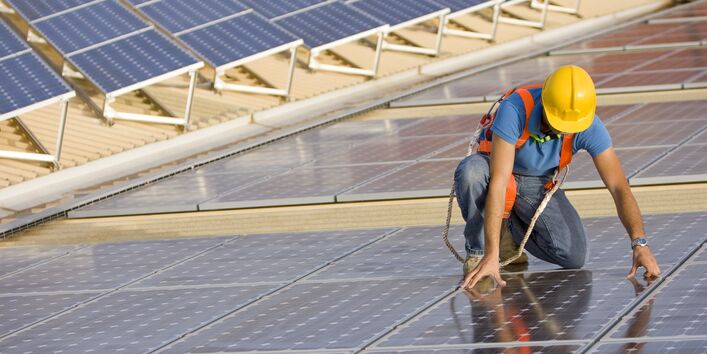Climate protection is also possible without nuclear energy
A recent analysis of global climate scenarios commissioned by the German Environment Agency shows that nuclear energy is not necessary to achieve the climate targets set out in the Paris Agreement. Instead, it is the rapid and targeted expansion of renewable energies that is crucial to advancing climate protection and the energy transition.
At the 28th World Climate Conference in Dubai, there is talk of a tripling of electricity generation from nuclear power, which is supposedly essential for climate protection. The Factsheet “What is the role of nuclear energy in achieving climate targets in global scenarios?” scientifically refutes these claims.
On behalf of the German Environment Agency, scientists from the Öko-Institut e. V. analysed ten global climate scenarios that achieve the climate targets under the Paris Agreement, as well as a scenario without specific targets focusing on the role of nuclear energy. Overall, global climate scenarios show very different results with regard to the future role of nuclear energy. The results show that it is not the expansion of nuclear energy that will enable the climate targets to be met, but the ambitious expansion of renewable energies. Even scenarios with a high level of nuclear energy generation fail to meet the climate targets if the share of renewable energies is low. The expansion of renewable energies is therefore the decisive and primary factor in achieving the climate targets. The global climate scenarios which were analysed also show that nuclear energy is not necessary to achieve the climate targets under the Paris Agreement.
Expansion targets for nuclear energy unrealistic
The factsheet also shows that tripling today's nuclear power plant capacity is not realistic. Such an increase in today's nuclear energy capacity would require approximately double the maximum historical capacity connected to the grid in a single year. On average, more new capacity would have to be added every year for 25 years than was the case at the historical maximum in 1985. These figures clearly show that tripling nuclear capacity by 2050 is neither realistic nor necessary to achieve the climate targets under the Paris Agreement.
There are also other arguments against the use of nuclear energy. People and the environment are exposed to a variety of dangers from uranium mining, the operation of nuclear facilities, final disposal and the use of waste products from civilian use in nuclear weapons.
Renewable energies well ahead of nuclear energy
The expansion of renewable energies has increased significantly worldwide in recent years and the climate scenarios analysed also impressively demonstrate their potential for future energy supply. Even in scenarios that grant nuclear energy more potential in the electricity mix, this technology plays a subordinate role overall.
For example, in the "MESSAGEix-Globiom" model from the International Institute for Applied Systems Analysis in Vienna, nuclear energy generation increases massively by 2050, but still only accounts for nine per cent of the primary energy supply in 2050 and 16 per cent of total electricity generation worldwide. In contrast, renewable energy sources will supply around 81 per cent of electricity generation in the same model.
The factsheet on the role of nuclear energy in achieving the climate targets was developed as part of the project “Climate impact of nuclear power based on an (empirical) analysis of GHG emissions along the entire value chain”, which will present its final results in September 2024.
